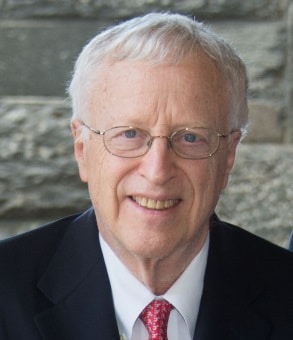
George A. Akerlof, Distinguished Financial Literacy Speaker
Nobel Laureate in Economic Sciences
University Professor, McCourt School of Public Policy, Georgetown University

Nobel Laureate in Economic Sciences
University Professor, McCourt School of Public Policy, Georgetown University
George A. Akerlof is University Professor at Georgetown. His research is based in economics, but it often draws from other disciplines, including psychology, anthropology, and sociology. He played an important role in the development of behavioral economics.
In 2001 he was co-recipient of the Nobel Prize in Economic Sciences, along with Michael Spence and Joseph Stiglitz . The Nobel Committee cited Akerlof’s 1970 paper, “The Market for ‘Lemons,’” which for the first time described the role of asymmetric information in causing market perversity. A vicious circle in used car markets illustrates the phenomenon. Potential sellers of used cars, with their superior information, withhold good cars from the market; buyers react by reducing the price they are willing to pay; and in turn sellers further reduce the quality of cars put up for sale.
In 2009 Professor Akerlof published Animal Spirits, with Robert Shiller; and in 2010, Identity Economics, with Rachel Kranton, He is currently working on a new book, again with Shiller, with the title Phishing for Phools.
Prior to joining Georgetown, Professor Akerlof taught, with only brief interruption, at the University of California at Berkeley from 1966 to 2010. He was Visiting Scholar at the IMF from 2010 to 2014. He has been senior economist at the President’s Council of Economic Advisers, and past president, vice president and member of the executive committee of the American Economics Association, and member of the Council of the Econometric Society. He is a trustee of Economists for Peace and Security, and co-director of the Social Interactions, Identity and Well-Being program of the Canadian Institute for Advanced Research. He was Cassell Professor of Economics at the London School of Economics from 1978 to 2010.
In 2001 he was co-recipient of the Nobel Prize in Economic Sciences, along with Michael Spence and Joseph Stiglitz . The Nobel Committee cited Akerlof’s 1970 paper, “The Market for ‘Lemons,’” which for the first time described the role of asymmetric information in causing market perversity.
Ever since Adam Smith, the central teaching of economics has been that free markets provide us with material well-being, as if by an invisible hand. In Phishing for Phools, Nobel Prize–winning economists George Akerlof and Robert Shiller deliver a fundamental challenge to this insight, arguing that markets harm as well as help us. As long as there is profit to be made, sellers will systematically exploit our psychological weaknesses and our ignorance through manipulation and deception. Rather than being essentially benign and always creating the greater good, markets are inherently filled with tricks and traps and will “phish” us as “phools.”
Phishing for Phools therefore strikes a radically new direction in economics, based on the intuitive idea that markets both give and take away. Akerlof and Shiller bring this idea to life through dozens of stories that show how phishing affects everyone, in almost every walk of life. We spend our money up to the limit, and then worry about how to pay the next month’s bills. The financial system soars, then crashes. We are attracted, more than we know, by advertising. Our political system is distorted by money. We pay too much for gym memberships, cars, houses, and credit cards. Drug companies ingeniously market pharmaceuticals that do us little good, and sometimes are downright dangerous.
Phishing for Phools explores the central role of manipulation and deception in fascinating detail in each of these areas and many more. It thereby explains a paradox: why, at a time when we are better off than ever before in history, all too many of us are leading lives of quiet desperation. At the same time, the book tells stories of individuals who have stood against economic trickery—and how it can be reduced through greater knowledge, reform, and regulation.